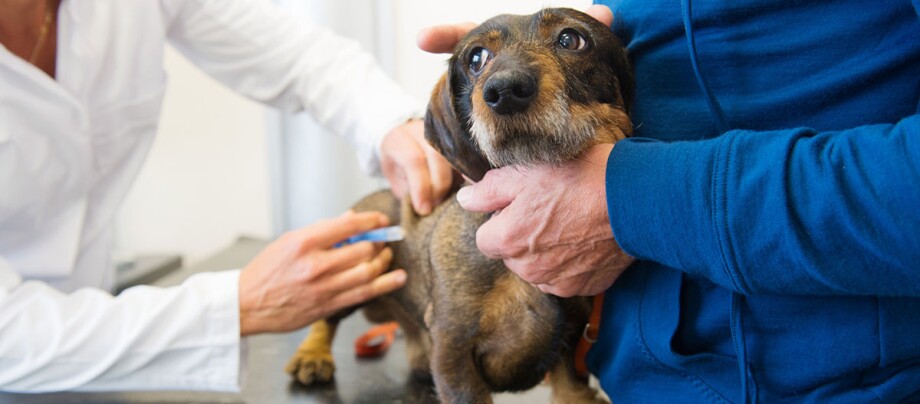Vaccinating Your Dog – Recommended or Necessary to Protect Your Dog
29.08.2023 - Reading time: 3 minutes

You love your dog and naturally, you want to protect it from disease. While this is understandable, veterinary medicine cannot (yet) cure all diseases and vaccination is currently the best tried and tested method to protect your dog from some of the most dangerous or even fatal canine diseases. Notwithstanding, few other topics in the field of dog health and disease prevention get tempers flaring as much as vaccination. Find out more about vaccinations in dogs, the costs and the implications. Read here which vaccinations are recommended or necessary to protect your dog from dangerous infectious agents.
The principle of protective vaccination: why do dogs need vaccines?
Naturally, every dog owner wants only the best for their pet. Depending on the vaccine, vaccination provides good to excellent protection against bacterial and viral diseases that are otherwise fatal for dogs or can cause serious complications if infection occurs.
Such vaccines not only protect the vaccinated animal from infection, they also help to eradicate, or at least suppress the disease-causing agents.
Primary and booster vaccinations: what does it all mean?
Primary vaccinations provide immune protection against certain pathogens. Boosters are then administered at certain intervals to ensure uninterrupted immune protection for your dog.
During their first weeks of life, puppies are protected by maternal (their mother’s) antibodies. With each week that passes, the number of maternal antibodies decreases, at different rates depending on the dog, until the puppy eventually has no antibodies left. To close this immunological gap, StIKoVet recommends vaccinating puppies up to four times between 8 and 16 weeks of life, depending on the vaccine. These vaccinations are administered “empirically”.
Adult dogs whose primary vaccination status is not known do not need to undergo primary vaccination retrospectively, as they definitely have no maternal antibodies. They should receive one or two shots depending on the vaccine. An antibody test can be carried out to be on the safe side.
Once a puppy has received primary vaccination, booster shots are administered according to the specifications of the relevant vaccine manufacturer.
Booster shots for rabies, distemper, HCC and parvovirus infection: every three years according to the current state of knowledge or the vaccine manufacturer’s instructions. Leptospirosis: annually or every six months.
As a general rule, only healthy dogs should be vaccinated. Dogs that are ill or have an autoimmune disease should not be vaccinated, and neither should old dogs. A complete pre-vaccination screening of your dog will also include a blood test. If you are not sure, feel free to contact our vets at Maxi Zoo, who will answer any questions you may have and give you sound vaccination advice for your pet.
New WSAVA guidelines
The new WSAVA guidelines have revolutionised previous vaccination recommendations.
The most important points are summarised here:
- The following are classified as core vaccines: DHP: distemper, hepatitis (HCC), parvovirus.
- Rabies vaccination is only considered essential in countries where the the virus is endemic. It is compulsory if prescribed by law in the relevant country.
- Leptospirosis is considered a non-core vaccine and is only recommended in high-risk areas.
- Primary vaccination for puppies: at 8 to 12 weeks of life: DHP – 14 to 16 weeks of life: DHP.
- There is no need for a booster at 12 (or 15/16) months of life, as 98% of the dogs tested have complete immune protection. It is indicated for dogs that have not achieved sufficient protection from puppy vaccination. A rapid antibody test at the vet can help determine whether or not it is necessary.
- The DHP vaccine (and the rabies vaccine, if applicable) should be administered at most every three years. Lifelong immunity is assumed after the last booster. A rapid antibody test can confirm this.
Vaccinating your dog: costs at a glance
The cost of vaccinations varies depending on the veterinary practice. It is best to enquire about this in advance by phone. Price differences also result from the choice of vaccine combinations and the “Fee Ordinance for Veterinarians” (GOT), which prescribes a certain framework within which veterinarians may determine their costs.
The costs of vaccination usually include:
- General screening
- Injection of the vaccine(s)
- Vaccine costs
- Identity check (microchip)
- Proof of vaccination in the vaccination card
The StIKoVet guidelines suggest the following vaccination schedule for primary immunisation:
- 8 weeks of life:
parvovirus, distemper, leptospirosis, HCC - 12 weeks of life:
parvovirus, distemper, leptospirosis, HCC and rabies - 16 weeks of life:
parvovirus, distemper, HCC - 15 months of life:
parvovirus, distemper, leptospirosis, HCC and, if necessary, rabies


